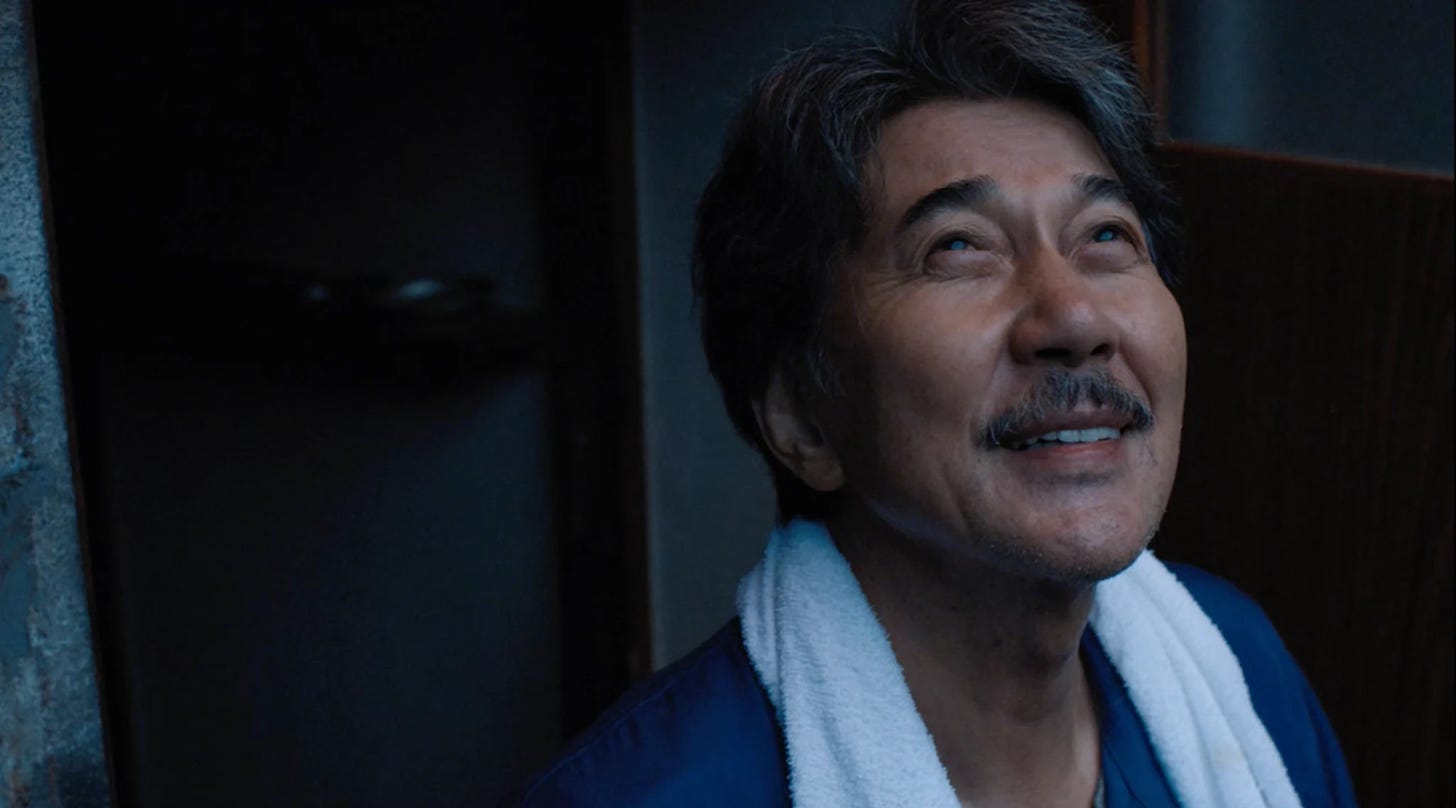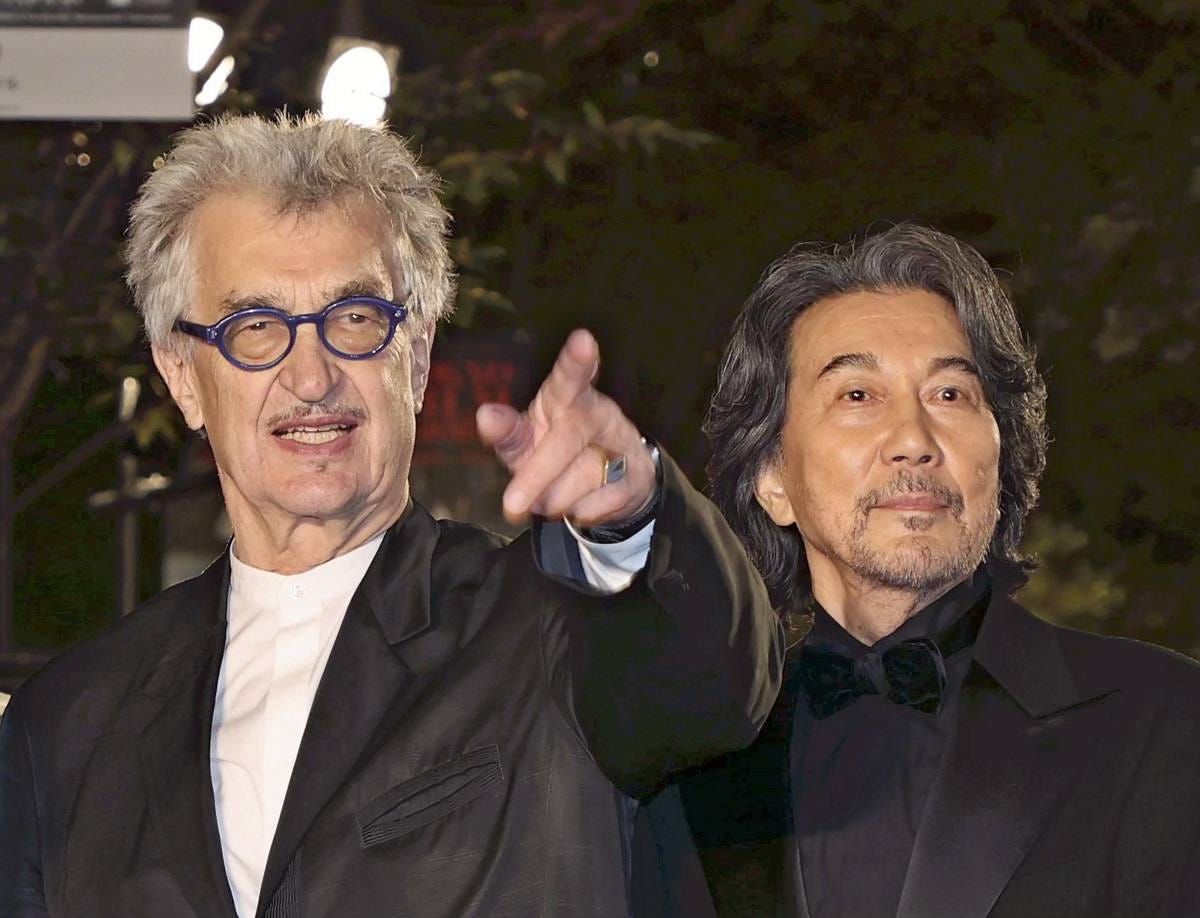"Perfect Days."
Wim Wenders latest is majestic in small, intimate ways. And yes he makes that possible. It's a film that stays on your mind.
This post is spoiler-free, so you can read it without having seen the movie, though I hope you will watch it soon if you haven’t.
It likely started with a prompt from a friend, film and wine guy Dan (going to make him a card in that manner, but perhaps a little more refined). I then saw the trailer to Wim Wender’s “Perfect Days.” Everything was aligning.
As a fan of architecture and city planning, I had already been aware of Japan’s “Tokyo Toilet” project where 16 famous architects created 17 public toilets in Japan’s Shibuya district.
All things Japan have been on my mind for a while now. Going to Tokyo is still a dream destination.
I like Wim Wenders a lot. Period.
Lou Reed’s “Perfect Day,” the emotional backbone of the movie reflected in the title, is a perfect song and one of my favorites from Reed.
The trailer evoked several distinct emotions — zen joy in aloneness; structure and ritual; melancholy; nature; love of music. I feel like maybe Wenders has been hanging around my life surreptitiously, perhaps. I’m not going to rule it out.
There was also the face of lead actor Kōji Yakusho, with its boundless ability to express emotion (which he does while barely speaking in the movie; he won best actor at the 2023 Cannes Film Festival). Wenders has said: “His character is the film.”
Yakusho’s face holds depth and secrets on top of the unmistakable messaging it evokes and that immediately connected, like a plug into a socket of my soul. From the moment I saw the trailer, his character, Hirayama, spoke something to me. He had a spartan lifestyle, laying on his simple bedding, listening to cassette tapes, reading a few pages of a book before bedtime, content to be away from the numbers. Oh, this guy is a guy I know, I thought, and I’m very interested in what he’s doing in this film.
He’s cleaning toilets, as you may now know — specifically the famed Tokyo Toilet toilets, as his main job, done mostly in silence with impeccable attention to detail and with the utmost care, as if the cleanliness of the toilets reflected the attitude of Japan in the macro and the beauty of the architectural achievement of the toilets in the minor.
In fact, “Perfect Days,” came about from an invitation to Wenders from the Tokyo Toilet project to come visit them and perhaps make a documentary. Instead, on a very small budget and over the course of a mere 16 days, he co-wrote the film with Takuma Takasaki and of course then directed it. There is a simplicity here that’s deceptive — it moves you with that simplicity, connects you to it, makes you want to embrace it, but also the film says so much more, complicated elements, without ever saying much about them.
There’s a story, but no real story to spoil because on the surface “Perfect Days” is just about the everyday routines of a common man, who seems perfectly happy and content with the simplicity of his ascetic lifestyle. People and events come into his life, of course, changing (or not?) the meaning of the film and hinting his life may have been more complex in the recent past.
I won’t go into those moments, even though I wouldn’t consider more than one a real spoiler. But even that reveal just adds another layer, it does not solve any mysteries about Hirayama or his life and the choices inside it.
On the surface, the movie is a kind of meditation on how to live a life. Hirayama’s life is a choice. For some people it might be odd or even sad. For others, and I clearly count myself here, there’s a real allure to someone who essentially turns themself into a ghost, who escapes modernity and even time itself, by disconnecting and reappearing, transformed.
Wenders told the UK’s The Guardian newspaper this little gem:
“All of my films are dealing with that question of how to live, even though for a long time I did not know that, because I was searching for answers, too. Perfect Days is quite a precise answer. I think a lot of people will watch it and feel a longing for a simpler way of life, for a reduction in what we have and what we consume. In many ways, Hirayama is a perfect example of how to live.”
I found that phrasing, that the film is “quite a precise answer” particularly interesting because the film itself is precise and vague at the same time. It begs you to make assumptions about Hirayama not by what he says, which is minimal, but what is unsaid, and it leaves the interpretation entirely up to you.
Like a lot of great art “explained” by its creator, the notion is often “it’s this, but it’s also something else,” or “I see it this way but it can be whatever your mind conjures.” In the interviews I’ve read since watching the film, Wenders tells the wider audience what he was intending without closing off other options, without limiting it. He’s acknowledging the precision of what he did as a filmmaker and how Hirayama’s life is crafted out of simplicity and specificity, but Wenders never says that’s all there is to the character or to the film.
One of the great achievements of this film is that it was conceived and turned around with almost unheard of quickness, particularly in the movie industry’s current state. I found another remark Wenders made to The Guardian very uplifting and true:
“It all happened so fast,” he says now, “but fast is beautiful. Fast is a gift. Fast is unleashed creativity.”
It feels like Wenders and Takasaki didn’t overthink it when they wrote the story, and yet they made the story so thoughtful at the same time. They moved on instinct and the unleashed creativity — about a fictional toilet cleaner who happens to be cleaning very real and very artistically important real life toilets, no less — transcended whatever perceived limitations were in place.
Wenders made art out of toilets.
I wanted to talk about what it’s like to be alone without being lonely after watching this film; about giving up everything to find something else; about nature in high-density Tokyo; and mostly about small pleasures in big choices, about finding a perfect day and stacking it up on top of another perfect day, creating your life in the process.
But I also don’t want to recount the movie scene by scene. I’d rather you just find the time and watch for yourself.
Whatever you get out of this movie, let’s hear about it in the comments when you’re ready.











It should come as no surprise to anyone that the creator of Paris, Texas and Wings of Desire is in touch with the sublime. I will admit for the first half hour or so I wasn't sure, and then I was. And then I really, really was.
Nice review, Tim.
My favorite movie in the last year, maybe in the last few years. An exquisite tone poem that held my attention despite very little “happening”, like being on a meditation retreat, and the small events that do happen somehow seem emotionally so deep against the backdrop of the slow, repetition of Hirayama’s daily routine.